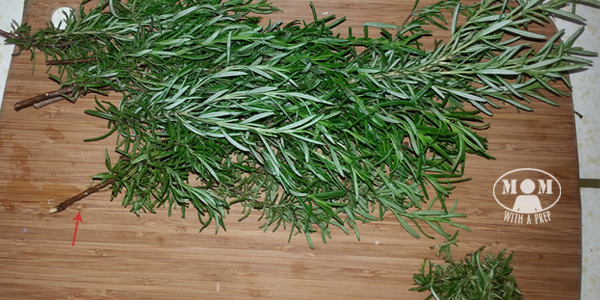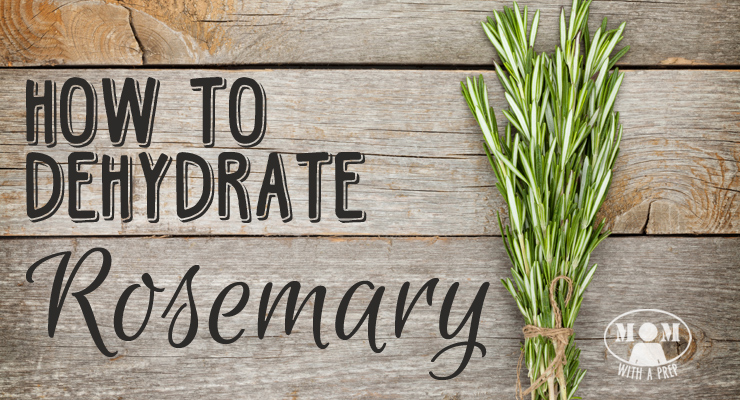
Years ago, a friend of mine moved into a house where there was a rosemary bush that was about 5′ high and 7′ around. It was massive. I was always so envious of it. I’d never been able to get my Christmas ‘tree’ rosemary sprig to grow much at all. I’d babied it, my husband fed it, and we just watched it be evergreen, but at least it didn’t die. Then, about a year ago, the thing began growing like crazy! And now our little spriggy bush is about 2′ high, 3′ around and putting out new growth everywhere. I’m even noticing it’s beginning to spread! So I needed a way to not only harvest some for dinner but actually preserve it.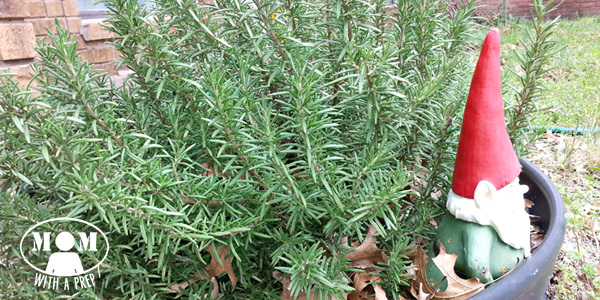 Rosemary is an evergreen that is in the mint family. If you have a healthy bush, you can harvest it year round. But sometimes, you don’t want fresh rosemary. You’ll probably want it dried for herb mixes or to put in stews to infuse flavor in the stewing time as opposed to the strong fresh flavor put in at the end. The herb not only tastes good in culinary dishes such as rosemary chicken and lamb, but it is also a good source of iron, calcium, and vitamin B6. (source) Do you want some tips on creating some rosemary-inspired food and beauty products at home? Let’s get started!
Rosemary is an evergreen that is in the mint family. If you have a healthy bush, you can harvest it year round. But sometimes, you don’t want fresh rosemary. You’ll probably want it dried for herb mixes or to put in stews to infuse flavor in the stewing time as opposed to the strong fresh flavor put in at the end. The herb not only tastes good in culinary dishes such as rosemary chicken and lamb, but it is also a good source of iron, calcium, and vitamin B6. (source) Do you want some tips on creating some rosemary-inspired food and beauty products at home? Let’s get started!
What Are The Uses of Rosemary?
Salad Dressings
The rosemary plant is a great contender for salad dressings. There are numerous recipes and ingredients you can team this plant with. For example, try mixing 1 tbsp of rosemary leaves with infused olive oil, garlic, water, pepper, mustard, and salt. When combined, these ingredients create one of the freshest salad dressings you have ever had.
Soups and Stews
You can also use the rosemary plant in other ways in the kitchen. When used in soups and stews, rosemary adds a beautiful presentation to your soups and stews. This plant has an aromatic and pungent taste (and smell!) which creates a delicious flavor and adds extra excitement to many of your favorite dishes. However, we suggest removing the rosemary sprigs as these can be tough to chew on.
Infused Olive Oil
Rosemary is a great plant to use for olive oil. Wash and dry four sprigs, add to a mortar and pestle and combine it with a drizzle of olive oil. The mortar and pestle help to combine the ingredients and speeds up the process. Once you’ve created an infused olive oil, you can use it as a salad dressing or drizzle it over some healthy vegetables. This adds a fresh taste to your food while improving your mood and boosting your brain power.
Hair Care
When incorporated into oil, the rosemary plant is also great to use on your hair for many reasons. First, it promotes hair growth by stimulating blood flow in the scalp. You can also use rosemary to thicken your hair and add lustrous shine. This result is great for people with thin, flat hair but who don’t want their locks to have additional shine.
Create your own rosemary hair rinse by combining 1 tbsp of rosemary leaves and water together in an infuser, and then adding it to a spray bottle. Use this rosemary hair rinse whenever your hair needs some extra moisture – such as during the winter.
Other Uses
Rosemary extract is a powerful antioxidant with anti-inflammatory characteristics which you can use for beauty purposes. You can use rosemary extract with food to prevent spoilage of fat in foods. Rosemary is also ideal to use as a decongestant and tonic, as the plant is a natural diuretic. It’s also great for perfumes, air fresheners, infusing, and just being so darn pretty hanging up in the living room!
How Useful is Dried Rosemary?
Before we share our favorite tips and tricks on this plant, let’s address the questions “how useful is dried rosemary?” and “what can you do with it?”
Rosemary is often used in beauty and household products for its beautiful and fresh smell. For example, once you’ve created dried rosemary, fill a small bag with dried sprigs. Add this to your clothes dryer to add a natural smell to your clothes. This is so simple and quick to do, and you’ll improve your clothes’ freshness, too.
Another way to use dried rosemary is to create hair shampoo. One idea is to combine rosemary leaves and oil and heat them together in a saucepan until they’re warm. Then you can strain the mixture and pour it into a spray bottle. When it’s time to use your homemade concoction, spray the mixture to your hair and leave it in for 20 minutes before washing out with tepid water.
As you can see, dried rosemary is extremely useful as it’s great for preserving the plant for use in the kitchen, on your hair, around your home etc. Unlike herbs such as thyme, rosemary holds its flavor, texture, and color once it’s dried. Drying your rosemary is a great way to use it another day without it going bad. Rosemary typically lasts for 10-14 days, but dried rosemary can keep for 1-3 years.
What is The Best Way to Dry Rosemary?
The best way to dry rosemary – in terms of speediness and effectiveness – is in the oven. Here, we will show you how to dry rosemary in the oven in just a few easy steps.
- First, wash and dry your rosemary and place it on a baking sheet, leaving enough room in between sprigs.
- Bake it in the oven for 1 to 2 hours until the rosemary is brittle.
- After 45 minutes, toss the rosemary to ensure you dry each side.
- Then, allow the rosemary to dry and crush the rosemary sprigs in your hand.
- Store the rosemary indoors in an airtight container or ziplock bag.
Alternatively, if you want to know how to dry rosemary in the microwave, here are some instructions to follow.
- First, begin by washing the rosemary and air drying it.
- Place a small amount of rosemary onto a towel on a plate.
- Place it in the microwave for 30 seconds.
- Toss the rosemary and put back in the microwave for another 30 seconds.
- Repeat this process for 2-4 minutes until the rosemary is brittle. Similar to the oven process, allow the rosemary to cool and then crush it in your hands.
Throughout both of these processes, you’ll know that the rosemary is completely dry when it crumbles easily between your fingers. If you have to rip pieces off, it needs more time in the oven/microwave. Also, make sure you leave a generous distance between the rosemary sprigs on the baking sheet to encourage them to dry faster.
How to Dry Rosemary (Tools)
Tools I use in my kitchen to dehydrate rosemary:
- Dehydrator: I use both the Excalibur and the Nesco FD-80. Both are great dehydrators on either end of the budget spectrum.
- Vacuum Sealer: I’ve used the Seal-a-Meal and wore it out after about twelve years, so now I use this FoodSaver with the regular mouth attachment and the wide mouth attachment.
- Canning jars or any clean jar with a close-fitting lid: Recycle old spaghetti jars if you are looking at storing just for a few months. Just make sure they are spotless and really dry, and store them in the dark.
- Oxygen Absorbers
- Zip Top Bags: For really short-term storage. I might even double bag it to get a little longer life out of it.
How to Dehydrate Rosemary (Steps)
If you want to learn how to dry rosemary, you will need to follow a couple of steps.
First, rinse it thoroughly. You can either soak it in a vinegar wash bath like this one or merely rinse it off in a powerful stream of water. Rosemary sprigs can collect a lot of stuff along the stems and leaves because it is so hardy. Don’t be afraid to get rough with the sprigs to get them clean. Shake off your sprigs and then lay them out on towels to allow them to dry (the drier you get them now, the less time it takes to dehydrate).
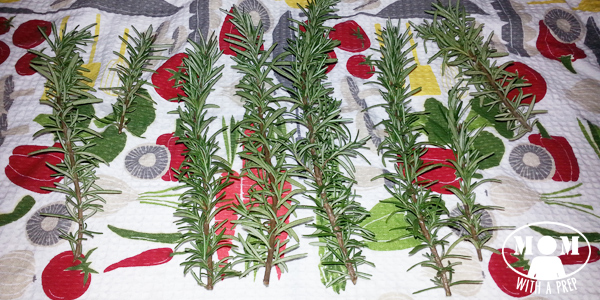 Tip: If you’re doing a lot of rosemary at one time, do a layer of towel, layer of rosemary, layer of towel, layer of rosemary, and repeat.
Tip: If you’re doing a lot of rosemary at one time, do a layer of towel, layer of rosemary, layer of towel, layer of rosemary, and repeat.
Next, lay out your sprigs on your dehydrator trays. You may have to cut them down to fit whatever dehydrator you like (like I mentioned earlier, I use the Excalibur here, but also love the Nesco FD-80, too, which is a great mid-budget machine).
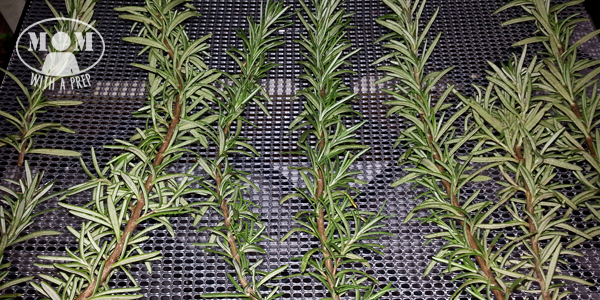
Rosemary is forgiving and you don’t have to be as careful about the sprigs not touching as you do with other fruits and vegetables. You can pile them a bit closer than this. Using my Excalibur, I also took out all the trays in the machine to give space for the trays to slide in easily with the sprigs. I was only doing about 4 trays worth because that will end up being more than year’s worth of dried rosemary for us since we can have it fresh during so much of the year.
Dehydrate for approximately 6-8 hours on 95F. You aren’t cooking the rosemary; you’re simply removing the moisture from the leaves. Your time may vary depending on the moisture level of the sprigs, the humidity in your home, and the power of your machine.
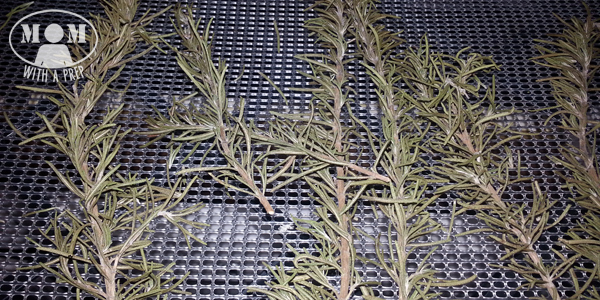
Now, there are all sorts of ways you can deal with the rosemary at this point, but I’m going to show you how we do it which is the quickest and least messy way for us.
Gather sprigs together.
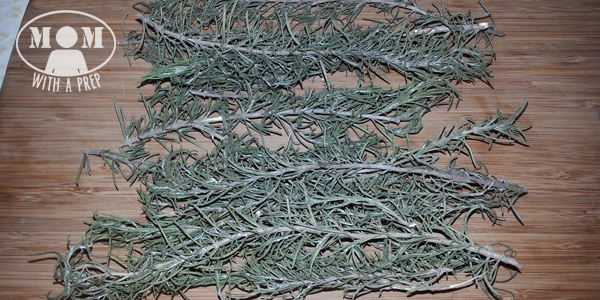
Take them in hand and twist them back and forth a few times.
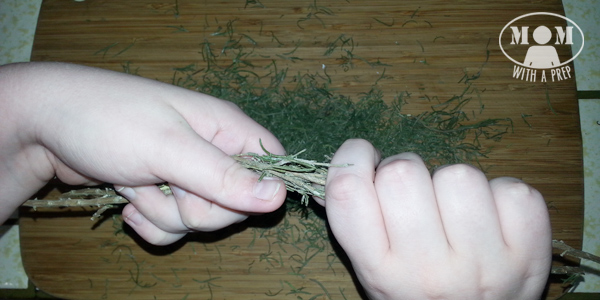
And this is what you’ll end up with this: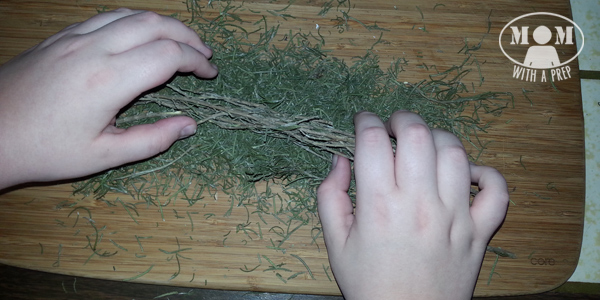
You will want to go through and pick out the little stems that will get in the mix, but it only takes a few moments to do so.
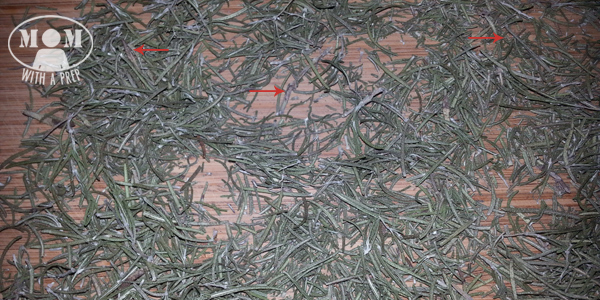
Here is where I then take it a step further and decide HOW I’m going to store this dehydrated rosemary. I can preserve it full leaf like this:
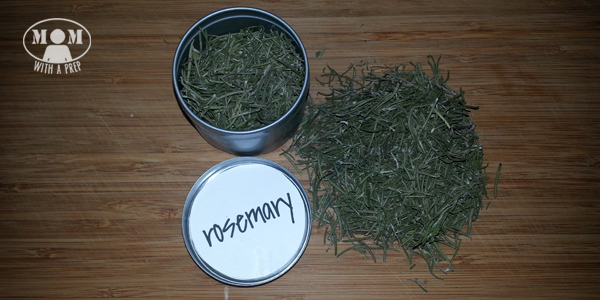
But I’m going, to be honest. As much as I love the flavor of rosemary, I don’t always like biting into the leaves in my recipes. Even if I chop them up a few times, I just don’t like the texture in my stews or on my chicken. Still, I do keep a selection done like this to use for herb mixes and specific dishes. This process is also my preferred way to keep it in longer-term storage because the less you mess with it, the longer it can last.
I can take the whole leaves and do this:
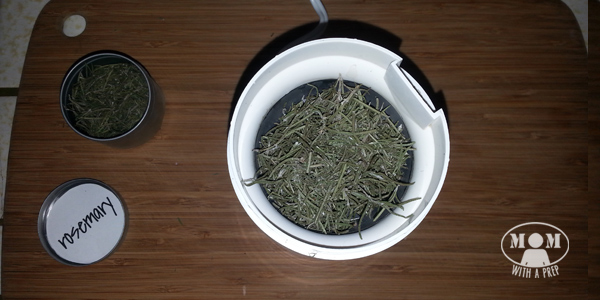
I’ll end up with my favorite way to use rosemary, which is in powder form. It just blends in so nicely with things, and I don’t get that weird texture when I chew.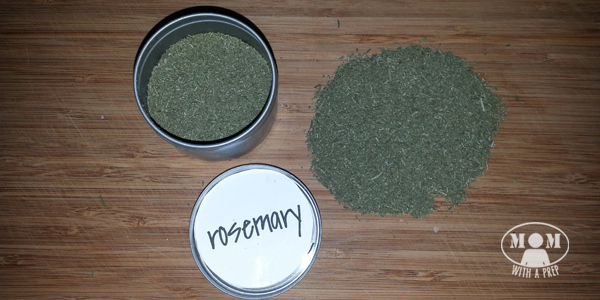
For those of you interested, I store my immediate use of kitchen herbs and spices in these tin, magnetic storage containers that then go on the side of my refrigerator. The longer-term storage is in canning jars in my pantry where I put an oxygen absorber in the can and seal it up. Then I don’t have to keep opening my long-term storage container to get to the daily use herbs but can just restock them as we use them up.
I’ll be honest, though: I don’t store my herbs and spices for longer than a year. Because we grow quite a bit of it, I dehydrate what we produce for the next year’s use. And any spices I store, I try to store in whole spice form instead of powdered spice form. They store better, longer, and are more flavorful when ground right before use than stored forever.
How to Air Dry Rosemary
An alternative way to dry your rosemary or any herb is to air dry it. You’ll want to remove some of your rosemary leaves from the ends of your sprigs (keep the fresh rosemary to preserve in oil in the freezer).
I will bundle my sprigs in groups of 3-4, trying to vary the size of sprig in each bundle so that they get good airflow through the bundle. I’m using a jute string tied into a slipknot, then tied off in a doctor’s knot to hold the slip knot in place.
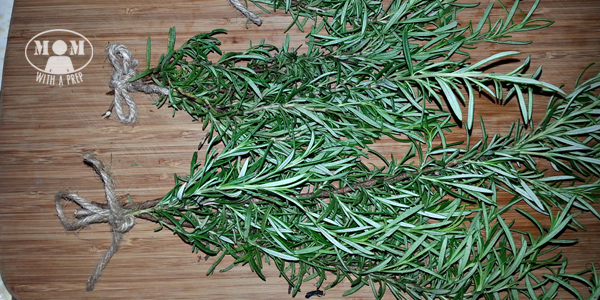
I had this adorable photo of this rosemary hanging out in our backyard, but it wouldn’t be an honest reflection to what we do. I don’t air dry anything outside. I don’t have an enclosed drying rack (yet), and we have enough flies, bugs, and critters that would be all over this stuff. Plus, I prefer to keep my food bug free, don’t ya know! But the humidity is also an issue. If you can get something dried in the afternoon, that’s great. But we have morning dew and high humidity for a good part of the year, and especially in the fall and spring we get even higher humidity all through the day because of the wetter weather. So I use my fireplace instead!
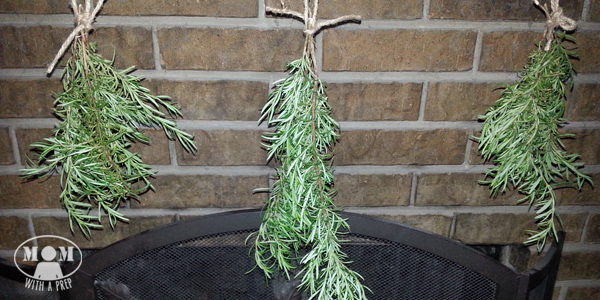
You can wrap your herbs up in paper bags to help keep the dust and such off, but I’ve never bothered by those things.
I’m always looking for great ways to use my dried rosemary because we seem to be knee-high in the stuff, and I found this recipe on Martha Stewart that is right up my alley: Rosemary Butter Cookies.
Want more recipes and ideas to dehydrate for your pantry? Check this out:
If you are like me and love having a recipe book in your hand to read through, make notes in, and have handy in the kitchen, I highly recommend the Ultimate Dehydrator Cookbook by Tammy Gangloff.
YOUR THOUGHTS? What are your favorite ways to use rosemary? Do you have any tips on dehydrating rosemary?
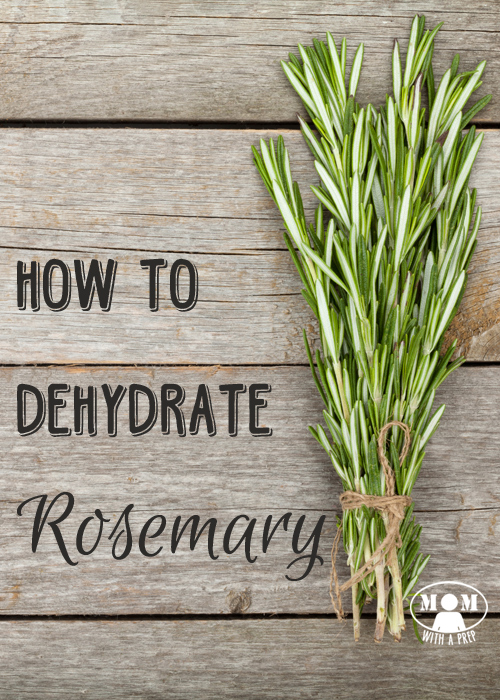
Becky is a wildlife enthusiast and pet and livestock care expert with a diploma in canine nutrition. With over a decade of experience in animal welfare, Becky lends her expertise to Simple Family Preparedness through insightful info about pets, livestock, bee keeping, and the practicalities of homesteading.


